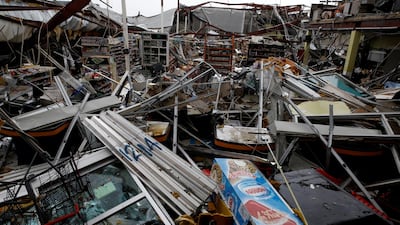The mayor of the capital of Puerto Rico hit back on Friday at the comments of a top US official who said federal efforts to help the island recover from the devastation of Hurricane Maria is "a good news story."
"This is a 'people are dying story,'" retorted Carmen Yulin Cruz, mayor of San Juan. "This is a life-or-death story."
The day before, Elaine Duke who, as acting secretary of Homeland Security, is helping coordinate US help after the hurricane said she was satisfied with the response so far.
"I know it is really a good news story in terms of our ability to reach people and the limited number of deaths that have taken place in such a devastating hurricane," Ms Duke said.
Hurricane Maria, the most powerful storm to hit Puerto Rico in nearly 90 years, has killed at least 16 people on Puerto Rico and more than 30 across the Caribbean.
In Puerto Rico, where most of the island's 3.4 million residents faced a 10th day without power and struggled to find clean water and fuel, Ms Cruz bristled at Ms Duke's comment.
"I would ask her to come down here and visit the towns and then make a statement like that," said the mayor. Ms Duke is scheduled to visit Puerto Rico later on Friday.
President Donald Trump defended his administration's handling of the disaster on Twitter.
"Puerto Rico Governor Ricardo Rossello just stated: "The Administration and the President, every time we've spoken, they've delivered …," he tweeted early on Friday.
Governor Rossello said the federal government has responded to his requests and that he was in regular contact with the director of the Federal Emergency Management Agency (FEMA) but more needed to be done.
"We are maximising all of the resources that we have so that we can deliver goods, water food and supplies," he said. "We do have severe logistical limitations. It has been enhancing but it's still nowhere near where it needs to be."
LONG ROAD BACK
Ms Cruz acknowledged President Trump's help, but asked for more immediate action. "Mr. Trump, we appreciate everything you're doing, and we know it can be done faster," she said on CNN. "Let's just put a crew out there with enough equipment and let's just push things out of the way and move."
Even with a ramped-up response, the problems facing Puerto Rico will take a long time to resolve.
More troops, medical supplies and vehicles were on the way to the island, which is a US territory, but it will be some time before it is back on its feet, according to the senior US general appointed to lead military relief operations.
"We're certainly bringing in more," said Lieutenant-General Jeffrey Buchanan on Friday, a day after he was appointed by the Pentagon to oversee the US response.
Air Force, Navy and Army medical capabilities as well as more aircraft, helicopters of different types, and more logistical support are being dispatched. "It's not enough, but we're bringing more in," the general said.
Asked how long it would take for Puerto Rico to recover, Gen Buchanan gave a slight sighbefore replying, "This is a very, very long duration."
Colonel James DeLapp, the Army Corps of Engineers commander for Puerto Rico who earlier said Maria's widespread destruction made it impossible to gauge how long it would take to restore power on the island, compared the enormity of the task with restoring electricity to Iraq during the war there.
"The terrain is significant. There is a logistical challenge clearly," said Col DeLapp. "This is a massive undertaking, one that I don't think that we've ever undertaken before, in terms of this magnitude. The closest thing we've had is when the Army Corps led the effort to restore Iraq's electricity in the early stages of the Iraq war in 2003 and 2004."
_____________________
Read more:
Trump waives cargo act to let more relief get through to Puerto Rico
Battered Puerto Rico hospitals on life support after Hurricane Maria
The names given to natural disasters tell us stories we know little about
Hurricane Maria: Power knocked out across Puerto Rico
Hurricane Maria heads toward already battered Caribbean islands
_____________________

